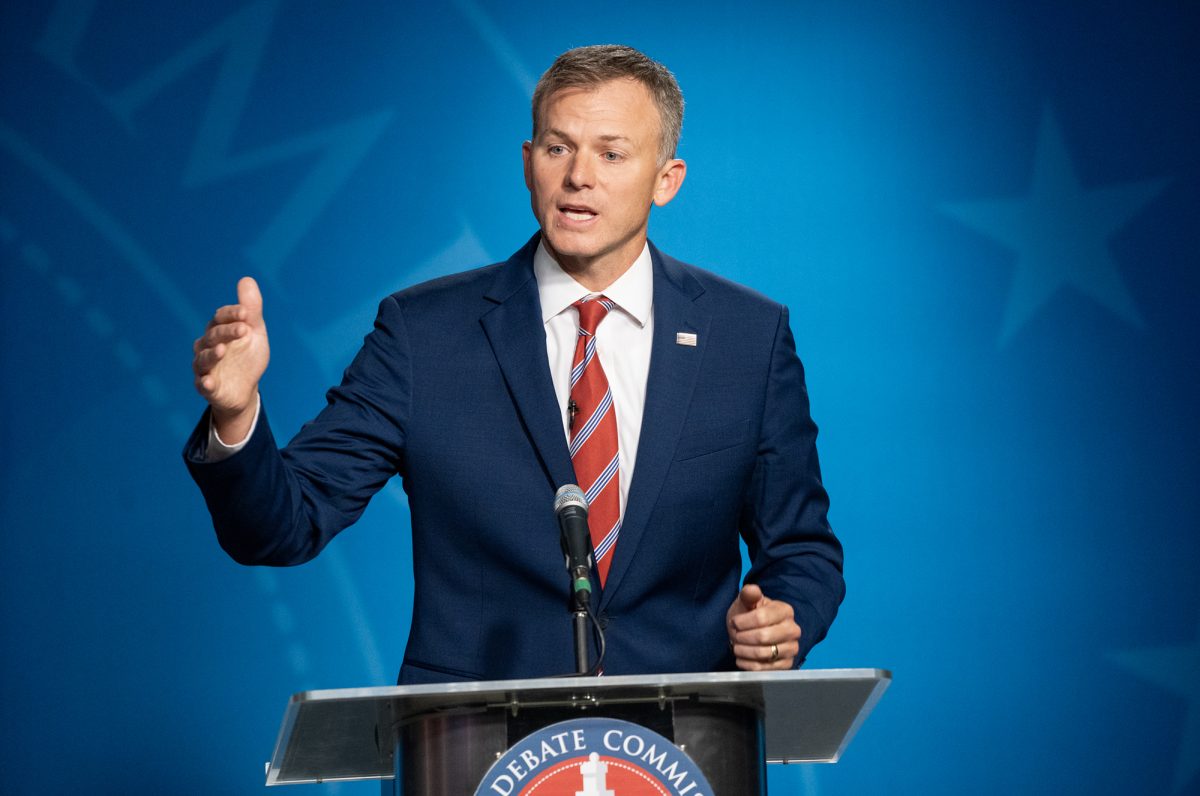Incumbent GOP Rep. Blake Moore and Democrat Bill Campbell will appear on the Nov. 5 ballot as candidates for Congressional District One’s seat in the House of Representative. District One is the home to multiple landmarks in Utah such as the Great Salt Lake, Hill Air Force Base and the University of Utah campus. Here is where these candidates stand on several issues based on research into them both.
Blake Moore
Before beginning his service in the House of Representatives in 2021, Moore worked abroad in healthcare and financial services. He has also worked in foreign service for the U.S. Department of State.
In the Congressional District One Debate, Moore explained that he believes federal government has the power to impact the cost of housing in Utah through the Low Income Housing for Defense Communities Act (H.R. 9659). This is a bill he proposed to provide tax credit to members of the armed forces for rental housing.
“Low income housing tax credit is incredibly bipartisan, and it’s proven to be very successful because it creates a market-based solution that allows for individuals to be able to get into living situations that will enhance their ability to grow,” Moore said.
In discussion of federal land use for housing expansion, Moore pointed to a bill he proposed called the Lodging Options Developed for Government Employees Act (H.R. 1314). The LODGE Act allows the Department of the Interior to make use of public lands to develop or rehabilitate housing for rent to field employees and members of the public.
“There has to be supply if we are going to experience growth,” Moore said. “Otherwise, prices will go out of control and congestion takes over.”
According to Moore’s website, he believes that “every child should be given opportunities to thrive, no matter their circumstances of birth.” Moore also supports programs to support low income mothers and children.
Moore co-led the introduction of the Care for Her Act (H.R. 5163), which aims to support women who are experiencing an unexpected pregnancy. This bill, if passed, would implement a child tax credit for pregnant women and healthcare services covered through various insurances including Medicaid. It would also suggest that higher education institutions information regarding available resources for parenting and pregnant students and more.
Additionally, Moore introduced the Connecting Forever Families Act (H.R. 8789) in 2022, which would temporarily increase funding to the Court Improvement Program to improve the court’s ability to conduct remote child welfare proceedings. His website also mentions his involvement in the Improving Adoption Outcomes and Affordability Act (H.R. 2375).
“In the summer of 2022 Americans witnessed the biggest pro-life win in a generation as Roe v. Wade was struck down by the supreme court,” Moore’s congressional website says.
Moore was one of over 200 Republicans who supported Roe v. Wade’s reversal.
“I am a strong supporter of the Second Amendment, which the courts have affirmed guarantees an individual’s right to keep and bear arms,” Moore’s website states.
Moore’s website says that he not only opposes efforts at weakening the Second Amendment, but he intends to do more than “merely be on defense.” In 2023 Moore cosponsored the Concealed Carry Reciprocity Act (H.R. 38), which regulates the carry or possession of concealed firearms across state lines.
Moore’s defense of the Second Amendment also includes support for legislation that keeps firearms out of the hands of those who intend to hurt themselves or others. He discussed his support for investments in mental health resources for those who need help in order to prevent gun violence before it occurs, and that it’s the responsibility of local communities mediate the effects of gun violence.
“As I have said before, the answer to violence will not be found in legislation passed by the federal government. We cannot delegate the responsibility of responding to despair and mediating distrust and division in our communities,” Moore’s congressional webpage says. “Elected officials, community leaders, churches and families all have a role in coming together to rebuild our sense of goodwill.”
Bill Campbell
Campbell works as the chief financial officer for Autoliv, an automotive safety supplier. He has also worked closely with organizations such as the Special Olympics and Habitat for Humanity.
Campbell said in an email statement that his main focus is expanding education access and affordability.
“Education is the best investment any individual can make,” Campbell wrote. “Whatever the opportunity or risk, better knowledge is the solution.”
He also gave examples of what he believes to be important outcomes of education.
“A more thorough comprehension of root causes and effects, a capability to utilize the most current technology to augment performance and the ability to critically think to ensure better outcomes,” he said.
Education policy is not listed in the “positions” section of Campbell’s website. However, similar to Moore, he does express his stance on multiple other policy issues that impact students at the U.
According to Campbell’s website, Campbell wants to reduce the cost of housing for current owners as well as for first-time buyers. He also hopes to invest in community wide benefits like creating safer streets and revitalizing distressed neighborhoods.
Campbell intends to reach these goals by incentivizing individuals through interest rate subsides and zoning ordinances as opposed to providing incentives to businesses.
During the Congressional District One debate, the candidates were asked if they support the use of federal land to expand housing and decrease housing costs. Campbell said he does not.
“I believe in clean air, clean water and open spaces. In the last four years we have actually lost some of the Utah land to the federal government and I believe there’s efforts in progress already that we may lose further land,” Campbell said. “We need to stop that. We need to preserve those open spaces.”
This article was written through research on each candidate. However, The Daily Utah Chronicle was unable to find information on Moore’s stance on public education and Campbell’s stance on reproductive rights, public safety or gun control.



